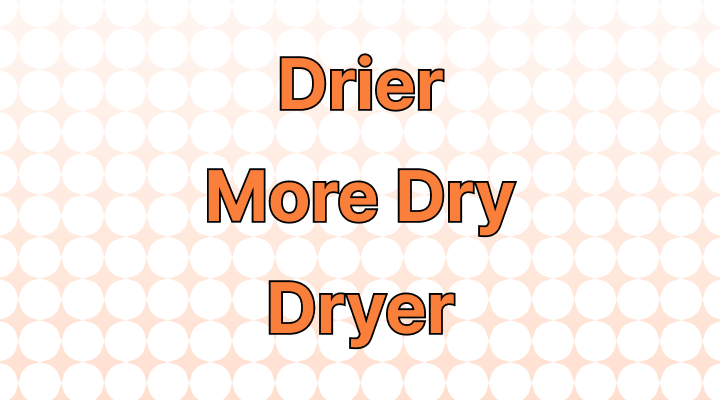Both "drier" and "more dry" are correct and compare the wetness of things, but their usage depends on preference, context, and the specific grammar style you follow. Meanwhile, a "dryer" is a machine used to remove the moisture from items.
"Drier" is the comparative form of the adjective "dry." It is typically used when comparing two items or situations to indicate that one is less moist or wet than the other. For example:
- "This gray towel is drier than that white towel."
The term "drier" can also be used to compare the same item or situation to itself at a different time:
- "The white towel is drier than it was yesterday."
"More dry" is also correct and can be similarly used when comparing multiple items or situations. For example:
- "The desert is more dry than the coastal region."
- "I prefer my laundry to be more dry before folding it."
In the first sentence with "more dry," the desert is being compared to another place, the coastal region. Meanwhile, in the second sentence, the state of the laundry is being compared to a more preferred state, specifically a more dry state, of itself.
In many cases, you can choose either "drier" or "more dry" based on your preference or the specific context of your sentence. Both forms are considered grammatically acceptable. However, if you are following a particular style guide or writing convention, it is a good idea to adhere to its recommendations.
Now, what about the noun "dryer"? "Dryer" is a noun that refers to a machine or appliance used to remove moisture from clothing, fabrics, or other items. A dryer is a household appliance commonly found in laundry rooms and is used for drying clothes. Take this sentence for example: "I need to put these wet clothes in the dryer to get them dry."
A hair dryer is another kind of dryer that specifically dries hair and is commonly found in bathrooms of first-world country homes. This is how the term would be used in a sentence: "I used a hair dryer to quickly dry my hair before going out."
In summary, "drier" and "more dry" are adjectives used to compare the dryness of objects and places, while "dryer" is a noun referring to a machine used to dry items. It is important to use the correct term depending on whether you are describing the dryness of something or referring to the appliance.
Example sentences
Drier
- After a day in the sun, her swimsuit felt drier than her towel.
- The desert air is much drier than the humid coastal climate.
- I prefer my laundry to be drier so that it doesn't take as long to hang dry.
- The sponge felt drier after wringing out excess water.
- The cake was drier than I expected, so I added some frosting to moisten it.
More dry
- The climate in this region is generally more dry than in the neighboring valleys.
- To make the dough more dry and workable, add a little more flour.
- Her skin became more dry during the winter months due to the cold weather.
- The soil here is becoming more dry due to the lack of rainfall.
- Can you please make sure the shirts are more dry before folding them?
Dryer
- I need to put these wet clothes in the dryer to get them dry.
- The dryer in our laundry room broke down, so we had to use a laundromat.
- I forgot my hair dryer for the trip, so I had to sleep with wet hair for two days.
- The dryer timer is set for 30 minutes to dry the towels completely.
- A new energy-efficient dryer was installed to save on electricity costs.
Want to sound like a native speaker?
Engram’s AI-powered grammar checker makes your English sound like a native speaker’s, suggesting natural English expressions on top of fixing grammar, spelling, punctuation, word order, and vocabulary.

Reference:















